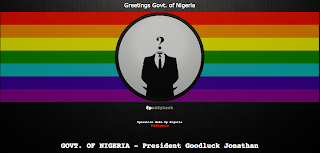Irishman Hacks Nigeria Govt Website, Gives FG 72 Hours To Renounce Anti-Gay Bill
Exasperated by the way Nigeria handles the homosexuality
matter, an Irish hacker -- who goes by the monicker Paddyhack -- has
conducted a cyber attack on the official government of Nigeria's
website. The 'assault' is apparently aimed at making President Jonathan
to veto the bill according to which all homosexuals in Nigeria are
subject to imprisonment. The website was attacked on Thursday night;
though things were later restored, it remains unknown if it were the
officials that took matters in their hands, or the attackers stepped
back.
Naij.com reminds that, according to the anti-gay bill, recently passed by the National Assembly of Nigeria to the vigorous support of Nigerians, convicted homosexual persons are subject to 14-years imprisonment.
In his address to Nigerians, the Irish hacker said thus: "Nobody should live in fear of being jailed, when their only action is loving another consenting adult, regardless of gender."
'Paddyhack' gave the President 72 hours to "renounce and veto this Bill."
"Failure to follow our order will unleash a torrent of fury aimed directly at the direction of your administration, starting with some startling but unsurprising evidence of corruption in your ranks. No need to start destroying evidence. I already have it," the Irish hacker, claiming to belong to the global Anonymous group, declared.
Nigeria.gov.ng, the website that was hacked, is Nigeria government's official homepage, equivalent to these of U.S' and UK's governments, and managed by the Information ministry of Nigeria. It is worth noting that this year, the ICT (Information and Communication Technology) department of the Information Ministry got N63.5 million from the national treasury. Of this total, the website in question received N10 million.
A curious fact: the Thursday night attack was announced by the Irish hacker in advance on his Twitter account: 'Paddyhack' launched #opNigeria on July 1."Just over two hours to launch of #OpNigeria," he tweeted in his Twitter diary. However, web administrators of the Nigeria.gov.ng webpage were unable to prevent the cyber attack.
Joseph Mutuah, the spokesman of the Ministry, could not provide the reasons behind the government's inability to provide adequate sequrity for the web infrastructure.
"They are hackers," he said, drawing analogy between cyber criminals and armed robbers who break into someone's property.
It seems that 'cyber wars' are rapidly becoming a key protest tool for the social media community of our country.
News source: naij.com
Naij.com reminds that, according to the anti-gay bill, recently passed by the National Assembly of Nigeria to the vigorous support of Nigerians, convicted homosexual persons are subject to 14-years imprisonment.
In his address to Nigerians, the Irish hacker said thus: "Nobody should live in fear of being jailed, when their only action is loving another consenting adult, regardless of gender."
'Paddyhack' gave the President 72 hours to "renounce and veto this Bill."
"Failure to follow our order will unleash a torrent of fury aimed directly at the direction of your administration, starting with some startling but unsurprising evidence of corruption in your ranks. No need to start destroying evidence. I already have it," the Irish hacker, claiming to belong to the global Anonymous group, declared.
Nigeria.gov.ng, the website that was hacked, is Nigeria government's official homepage, equivalent to these of U.S' and UK's governments, and managed by the Information ministry of Nigeria. It is worth noting that this year, the ICT (Information and Communication Technology) department of the Information Ministry got N63.5 million from the national treasury. Of this total, the website in question received N10 million.
A curious fact: the Thursday night attack was announced by the Irish hacker in advance on his Twitter account: 'Paddyhack' launched #opNigeria on July 1."Just over two hours to launch of #OpNigeria," he tweeted in his Twitter diary. However, web administrators of the Nigeria.gov.ng webpage were unable to prevent the cyber attack.
Joseph Mutuah, the spokesman of the Ministry, could not provide the reasons behind the government's inability to provide adequate sequrity for the web infrastructure.
"They are hackers," he said, drawing analogy between cyber criminals and armed robbers who break into someone's property.
It seems that 'cyber wars' are rapidly becoming a key protest tool for the social media community of our country.
News source: naij.com





Comments